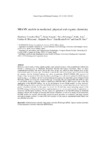MIANN models in medicinal, physical and organic chemistry

View/
Use this link to cite
http://hdl.handle.net/2183/20773Collections
- Investigación (FIC) [1679]
Metadata
Show full item recordTitle
MIANN models in medicinal, physical and organic chemistryAuthor(s)
Date
2013Citation
González-Díaz H, Arrasate S, Sotomayor N, Lete E, Munteanu CR, Pazos A, et al. MIANN models in medicinal, physical and organic chemistry. Curr Top Med Chem. 2013;13(5):619-41
Abstract
[Abstract] Reducing costs in terms of time, animal sacrifice, and material resources with computational methods has become a promising goal in Medicinal, Biological, Physical and Organic Chemistry. There are many computational techniques that can be used in this sense. In any case, almost all these methods focus on few fundamental aspects including: type (1) methods to quantify the molecular structure, type (2) methods to link the structure with the biological activity, and others. In particular, MARCH-INSIDE (MI), acronym for Markov Chain Invariants for Networks Simulation and Design, is a well-known method for QSAR analysis useful in step (1). In addition, the bio-inspired Artificial-Intelligence (AI) algorithms called Artificial Neural Networks (ANNs) are among the most powerful type (2) methods. We can combine MI with ANNs in order to seek QSAR models, a strategy which is called herein MIANN (MI & ANN models). One of the first applications of the MIANN strategy was in the development of new QSAR models for drug discovery. MIANN strategy has been expanded to the QSAR study of proteins, protein-drug interactions, and protein-protein interaction networks. In this paper, we review for the first time many interesting aspects of the MIANN strategy including theoretical basis, implementation in web servers, and examples of applications in Medicinal and Biological chemistry. We also report new applications of the MIANN strategy in Medicinal chemistry and the first examples in Physical and Organic Chemistry, as well. In so doing, we developed new MIANN models for several self-assembly physicochemical properties of surfactants and large reaction networks in organic synthesis. In some of the new examples we also present experimental results which were not published up to date.
Keywords
Artificial neural networks
Organic reaction networks
Drug-target networks
Protein interaction networks
Multitarget QSAR
Surfactant QSPR models
Organic reaction networks
Drug-target networks
Protein interaction networks
Multitarget QSAR
Surfactant QSPR models
Editor version
Rights
The published manuscript is avaliable at Eureka Select
ISSN
1568-0266
1873-4294
1873-4294





